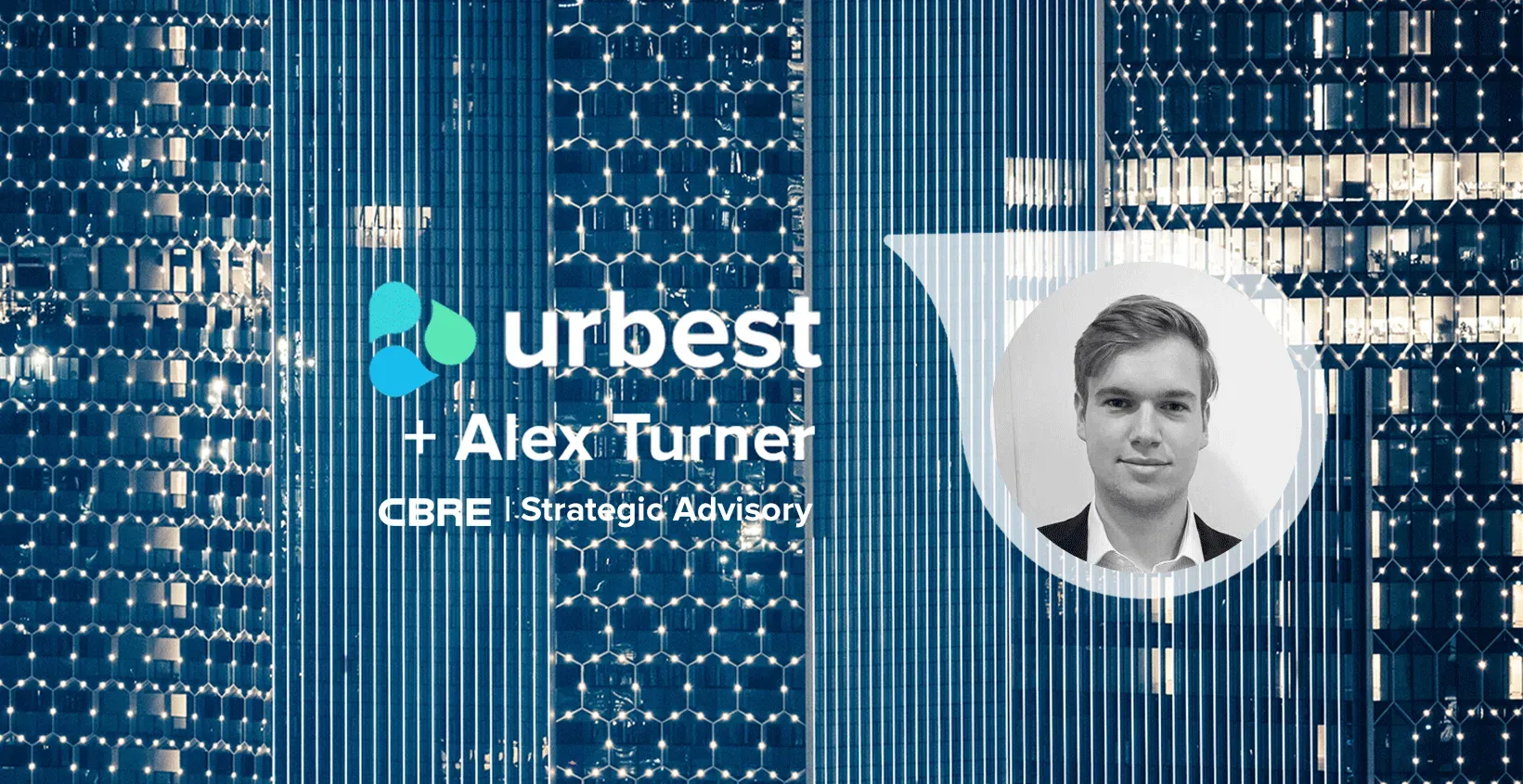Digitalisation and property management. New property technologies in the eyes of Alex Turner.

We had a great coffee talk about the changing times in the proptech world, as well as new property maintenance technologies. Enjoy the discussion.
Alex works for Strategic Advisory at CBRE helping large companies understand the transition and relation between digital interfaces, physical spaces and humans. This includes digital transformations, smart buildings and people-centric experiences. Alex is also a speaker in academic institutions such as UCL and a blog writer.
Urbest: What are the key points of interaction between the physical and digital spaces?
Alex Turner: On this, we often talk about PHD (physical, human, and digital). Many people see the digital as the connector of the physical and the human spheres, where I see the physical and digital worlds as linked by humans. This is quite exciting to think about it, because we treat the digital and the physical as equals.
The pandemic allowed us to explore more about the digital world and in some aspects was a success.
Urbest: What do you think are the main challenges that physical spaces face today when they try to digitalise the processes or become more digital?
Alex Turner: When you are talking about transformative technologies, to improve the lives of the clients or customers, it is difficult to point to any particular aspect of it. Something that's really important is the data. The data that we have in real estate is very fragmented". Sometimes we have good data inputs, but we lack a cohesive data environment to collect, manage, and share documentation. When we are able to see more data, to share more data, and collaborate on it with multiple parties, then we are going to see the real value of digital in the physical spaces.
The data analytics that you have in the digital world is so much cleaner than the one we have from buildings at the moment. One question is "who owns the data?". When we talk about buildings - it is sensitive data: the tenant, the landlord, the people who work there, the employees. Increasingly we are going to see a push back against this.
Urbest: What do you think about the factors that can facilitate the adoption of new technologies?
Alex Turner: I think that many aspects need to be right. Real Estate is a deeply socialised industry, and I think having social influences is a huge part of it. When you start to discuss the way these tools and technologies are handled in our lives, it starts to spread via word of mouth.
There are other aspects as well: there has to be genuine value created from adopting technologies that make our lives much easier as opposed to creating products that don’t solve a clearly defined problem. Also, the performance of some of these frontier technologies. Once we start in the right place and once you get the performance that you expect, then we will start to look at the regulations, and accelerate the adoption of technologies through that.
Something that we discuss is if regulation or education comes first. I personally believe that it is a little bit of both. The regulation needs to be matched with improved education.
Urbest: How advanced is the digitalisation of property maintenance?
Alex Turner: It is something that was accelerated by COVID-19. From the perspective of the younger generation - they don't see their lives without the digital world. On-demand services are a big part of that. I think property managers start to realise this and how they can create operational efficiencies and maintenance experiences that are easier through the use of technology.
Urbest: You mention "communication and collaboration" and you wrote about that in your article: "Creating social spaces to allow us to communicate".
Alex Turner: The focus of the article was is on pulling down the walls that act as barriers to communication. This is as important in the office as the virtual world. I think there are exciting technological opportunities in collaboration, meetings. Can you replicate that physical environment of having a social space that allows us to communicate and socialise freely in the virtual world? I am excited about what we will see in the coming years in this space.
Urbest: Do you find any differences between the digitalisation of maintenance in London and the rest of the UK or Europe?
Alex Turner: It has been a massive and globalised acceleration of digitalisation. It is very easy to argue on both sides in terms of whether the pandemic is increasing or reducing the importance of our borders. Now you're seeing people who typically would have clustered around hubs like London, move out into other cities of the UK.
I think Paris will certainly benefit from the uncertainty of Brexit, and Berlin as well. Europe is still behind the US in terms of creating the conditions for technology to thrive, but I remember hearing a little bit about Macron’s labour reforms and special visas for tech. But it would be interesting to see how far this can go. Will we start to see more outsourcing and distributed working. Will we start to see more fantastic founders coming out of SubSaharan Africa, Eastern Europe?
Urbest: Do you think that property maintenance management needs to be educated in order to accelerate the process of digitisation? A lot of physical spaces right now are running their maintenance management in an old school way. Sometimes one of their barriers is that they say they don't have the digital skills or sometimes they don't have access to funding.
Alex Turner: Definitely. For me there's a lot of education that needs to be done in this sector and whether that's property management, property maintenance or just real estate in general. Even as simple as improving the way we work, making our own lives easier I think is really exciting. There is maybe fear of the unknown, fear of whether technology will replace my job. It does happen and we have seen throughout the course of history that the adoption of technology has led to changes in our work habits. I don't think it is necessarily a bad thing as long as we are up-skilling those workers. I think the movement towards more fulfilling, more creative work, working with genuine innovations rather than putting together market reports, even as simple as being able to automate that or have a dashboard where you very quickly analyse all the utilities and the energy usage. Can you create dashboards that observe the happiness and the wellness of your workforce? I'm not saying we should all be monitored over our shoulder, but what can we do to make the lives of our workers and managers easier. Even just as simple as walking in the building and knowing the floor you're heading to, you know exactly where your space flexes, where are the free spaces, where the conversations are happening. I think there's a lot that still needs to be figured out and I think property management and property maintenance are 2 areas that, if given the right smart devices, will see a massive acceleration in efficiency.
Urbest: That's one of the key things at Urbest: deliver an efficient way to have a clear workload and access to a dashboard from many devices. That's why I was wondering what was your point of view because there are many tools out there that are trying to help organisations to be more connected but there is also a resistance to change - which is often seen in these transitions.
Alex Turner: I think there are 2 aspects to this. I think for property management maintenance you need to combine convenience and good experience. Whether that's advanced property management services and tools that easily allow customers to receive support - which I think of Urbest are heading towards.
An enjoyable experience - is another point. I mean that one shouldn’t get out of a bed to go and fix the shower. It is also convenient that the tool is available from the palm of their hand so one should not need to run downstairs and speak to a manager. In that regard, I think anything that can improve the experience and the convenience is really important. But you know, these things take time and in my view, they are in the early stages today. The growth in funding for proptech companies is growing at a decent rate and that is really exciting. Also, it doesn't take too long to form new habits and after a while, people continue with these habits and working patterns we have become accustomed to over the pandemic. Anything that we can do to make the experience better or more convenient for our work should be promoted and can be successful if done in the right way.
Urbest: Last question, would you like to share any recommendations with the service managers?
Alex Turner: It is about not being scared of technology and not thinking that it is too far out of reach. Education is important at all levels and not everyone has to be a coder or have software development skills. I think just a basic understanding and appreciation of some of these forms of technologies would be really important.
You can follow Alex´s blog www.proptechonapage.com where he takes concepts that may seem slightly abstract or intangible and makes them more tangible in real life and in ways that we can all adopt.
Would you like to start your transformation now? Don’t miss the next article about creating confidence in collaboration, data quality and value with smarter task management. https://blog.urbest.io/creating-confidence-in-collaboration-data-quality-and-value-with-smarter-task-management/
